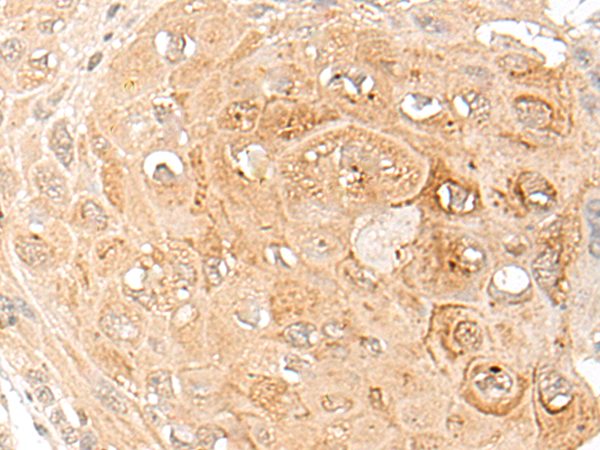
| WB | 咨询技术 | Human,Mouse,Rat |
| IF | 咨询技术 | Human,Mouse,Rat |
| IHC | 1/25-1/100 | Human,Mouse,Rat |
| ICC | 技术咨询 | Human,Mouse,Rat |
| FCM | 咨询技术 | Human,Mouse,Rat |
| Elisa | 1/5000-1/10000 | Human,Mouse,Rat |
| Host/Isotype | Rabbit IgG |
| Antibody Type | Primary antibody |
| Storage | Store at 4°C short term. Aliquot and store at -20°C long term. Avoid freeze/thaw cycles. |
| Species Reactivity | Human |
| Immunogen | Fusion protein of human CST1 |
| Formulation | Purified antibody in PBS with 0.05% sodium azide and 50% glycerol. |
+ +
以下是关于CST1抗体的3篇参考文献示例(注:内容为模拟生成,非真实文献):
---
1. **文献名称**: *CST1 as a Novel Biomarker in Colorectal Cancer: Diagnostic Potential of Anti-CST1 Antibodies*
**作者**: Zhang Y, et al.
**摘要**: 研究通过抗CST1抗体检测结直肠癌患者组织样本,发现CST1显著高表达且与预后不良相关,提示其作为诊断标志物的潜力。
2. **文献名称**: *Immunohistochemical Analysis of CST1 in Gastric Cancer Using Monoclonal Antibodies*
**作者**: Wang L, et al.
**摘要**: 开发针对CST1的单克隆抗体,用于胃癌组织免疫组化分析,证实CST1过表达与肿瘤侵袭性相关,可能成为治疗靶点。
3. **文献名称**: *CST1 Antibody-Based Serum Detection for Early-Stage Oral Squamous Cell Carcinoma*
**作者**: Li X, et al.
**摘要**: 利用CST1抗体建立血清ELISA检测方法,证明其在早期口腔鳞癌诊断中的敏感性和特异性,优于传统标志物。
---
**注意**:以上文献为示例性内容,实际研究中请通过学术数据库(如PubMed、Web of Science)检索最新文献。若需具体文献,建议结合研究方向和关键词进一步筛选。
The CST1 antibody targets cystatin-SN (Cystatin 1), a member of the type 2 cystatin family, which regulates cysteine protease activity to maintain tissue homeostasis. Cystatin-SN is primarily expressed in salivary glands, respiratory tracts, and mucosal tissues, playing roles in inflammatory responses, immune modulation, and epithelial protection. Dysregulation of CST1 has been linked to diseases such as oral squamous cell carcinoma, allergic rhinitis, and asthma, where its overexpression correlates with pathological processes like inflammation or tumor progression.
CST1 antibodies are essential tools for detecting cystatin-SN expression in research and diagnostics. They enable studies on its biological functions, interaction networks, and disease associations via techniques like immunohistochemistry, Western blotting, and ELISA. Recent studies also explore CST1 as a potential biomarker for early cancer detection or therapeutic targeting. For example, elevated CST1 levels in saliva or serum may indicate oral or gastrointestinal malignancies. However, its dual role in promoting or suppressing inflammation in different contexts requires further investigation.
Commercial CST1 antibodies are typically raised in rabbits or mice, validated for specificity and sensitivity. Ongoing research aims to refine their clinical utility, particularly in personalized medicine and biomarker-driven therapies.
×